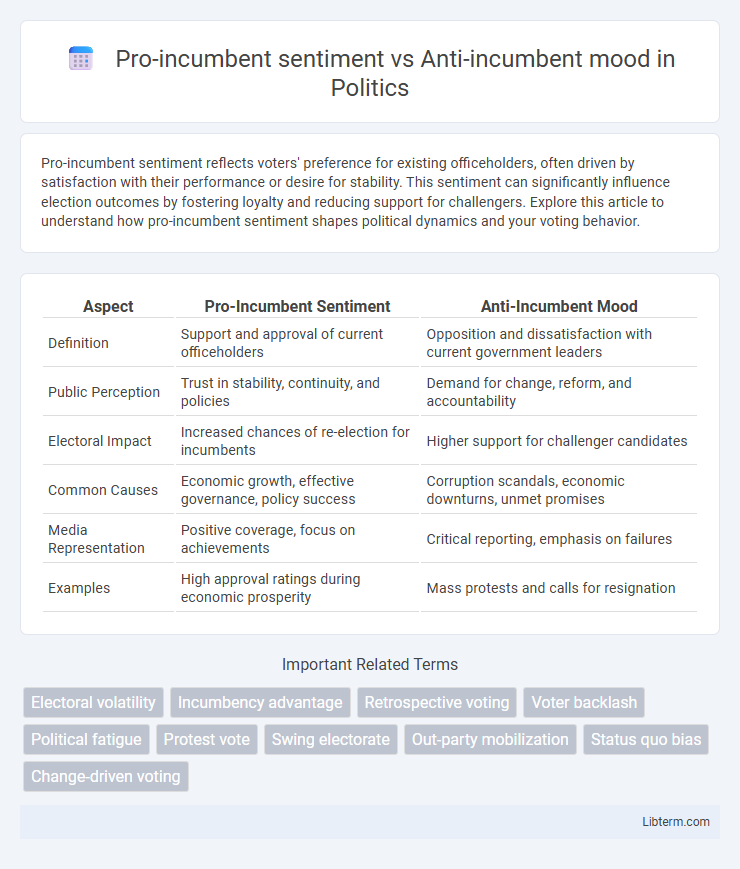Pro-incumbent sentiment reflects voters' preference for existing officeholders, often driven by satisfaction with their performance or desire for stability. This sentiment can significantly influence election outcomes by fostering loyalty and reducing support for challengers. Explore this article to understand how pro-incumbent sentiment shapes political dynamics and your voting behavior.
Table of Comparison
| Aspect | Pro-Incumbent Sentiment | Anti-Incumbent Mood |
|---|---|---|
| Definition | Support and approval of current officeholders | Opposition and dissatisfaction with current government leaders |
| Public Perception | Trust in stability, continuity, and policies | Demand for change, reform, and accountability |
| Electoral Impact | Increased chances of re-election for incumbents | Higher support for challenger candidates |
| Common Causes | Economic growth, effective governance, policy success | Corruption scandals, economic downturns, unmet promises |
| Media Representation | Positive coverage, focus on achievements | Critical reporting, emphasis on failures |
| Examples | High approval ratings during economic prosperity | Mass protests and calls for resignation |
Understanding Pro-Incumbent Sentiment
Pro-incumbent sentiment reflects voter approval and confidence in current officeholders, often driven by satisfaction with economic performance, policy outcomes, and political stability. This sentiment positively influences electoral prospects by reinforcing the perceived legitimacy and effectiveness of incumbents. Understanding these factors helps predict electoral behavior and design strategies to sustain or challenge political mandates.
Defining Anti-Incumbent Mood
Anti-incumbent mood refers to widespread voter dissatisfaction and opposition towards current officeholders, often driven by perceived government inefficiency, corruption, or economic decline. This sentiment manifests in electoral behavior favoring challengers or opposition parties seeking systemic change. Understanding anti-incumbent mood is critical for analyzing electoral volatility and predicting political turnover in democratic systems.
Historical Trends in Voter Attitudes
Historical trends in voter attitudes reveal that pro-incumbent sentiment often surges during periods of economic growth and national stability, reflecting public satisfaction with current leadership. Conversely, anti-incumbent mood tends to dominate during economic downturns or political scandals, driving demand for change and new leadership. Electoral data from multiple democracies show that these sentiment shifts significantly influence incumbent reelection rates and party turnovers.
Key Drivers Shaping Pro-Incumbent Support
Economic stability and consistent policy implementation serve as primary key drivers shaping pro-incumbent support, fostering voter confidence in ongoing governance. Effective communication of achievements in job creation and infrastructure development significantly bolsters positive perceptions of incumbents. Furthermore, strong leadership during crises, such as public health emergencies, enhances trust and solidifies pro-incumbent sentiment among the electorate.
Causes of Rising Anti-Incumbent Sentiment
Rising anti-incumbent sentiment is often fueled by economic instability, high unemployment rates, and growing income inequality, which erode public trust in current leaders. Corruption scandals and perceived government inefficiency exacerbate voter dissatisfaction, prompting demands for political change. Social polarization and misinformation further deepen divisions, amplifying negative perceptions of incumbents.
Impact on Election Outcomes
Pro-incumbent sentiment often leads to higher reelection rates by reinforcing voter trust in current officeholders' policies and performance metrics, especially in stable economic conditions. Conversely, an anti-incumbent mood typically signals widespread public dissatisfaction, increasing the likelihood of electoral turnovers and political shifts as voters seek change. Election outcomes are heavily influenced by these sentiments, with pro-incumbent attitudes fostering continuity and anti-incumbent moods driving reformist mandates.
The Role of Media in Shaping Public Opinion
Media outlets significantly influence pro-incumbent sentiment and anti-incumbent mood by shaping narratives around political performance and policy outcomes. Positive coverage emphasizing government achievements increases public approval, while critical reporting on corruption, inefficiency, or scandals intensifies voter dissatisfaction. Social media platforms amplify both sentiments by facilitating rapid information dissemination and echo chambers, which can polarize public opinion toward or against incumbents.
Social and Economic Factors Influencing Sentiment
Economic stability, including low unemployment rates and rising wages, often fosters a pro-incumbent sentiment as citizens associate current leadership with positive financial outcomes. Social factors such as public trust in government institutions and effective communication during crises can reinforce support for incumbents. Conversely, high inflation, income inequality, and social unrest contribute to an anti-incumbent mood by eroding confidence in the ability of existing leaders to address pressing societal challenges.
Case Studies: Elections Marked by Incumbent Sentiments
Elections featuring pro-incumbent sentiment often showcase voter preference for continuity, as seen in Germany's 2017 federal election where Angela Merkel's CDU retained power due to economic stability and steady governance. Conversely, anti-incumbent mood dominates contests like the 2011 Egyptian parliamentary elections, where widespread dissatisfaction with Hosni Mubarak's regime sparked calls for radical change. These case studies illustrate how socio-economic factors and political performance critically influence electoral outcomes in incumbent versus challenger dynamics.
Future Implications for Democratic Processes
Pro-incumbent sentiment enhances political stability by reinforcing trust in existing leadership and facilitating continuity in policy implementation. Anti-incumbent mood drives demand for political renewal, influencing democratic processes through increased voter turnout and electoral volatility. The balance between these sentiments shapes democratic resilience, affecting governance effectiveness and citizen engagement in future elections.
Pro-incumbent sentiment Infographic

 libterm.com
libterm.com